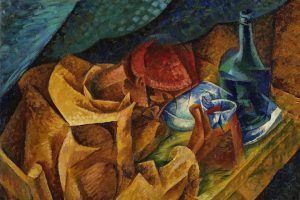Rozalind Dineen at the TLS:
 It would be uncool, priggish, unthinking to care too much about the artist’s intoxication. Torments require relief and expression: numbing and utterance; alcohol and art. You can’t unpick the work from the circumstances of its creation, nor should you want to. In 1975, the critic Lewis Hyde tried caring about Berryman. A few years after the poet’s death, Hyde published an essay, an angry blast against the romanticization of the inebriated artist. When Hyde read The Dream Songs he didn’t hear the genius so much as “the booze talking”. “Its tone is a moan that doesn’t revolve.” Hyde seemed to believe – unfashionably – that Berryman’s work would have been better had he been sober.
It would be uncool, priggish, unthinking to care too much about the artist’s intoxication. Torments require relief and expression: numbing and utterance; alcohol and art. You can’t unpick the work from the circumstances of its creation, nor should you want to. In 1975, the critic Lewis Hyde tried caring about Berryman. A few years after the poet’s death, Hyde published an essay, an angry blast against the romanticization of the inebriated artist. When Hyde read The Dream Songs he didn’t hear the genius so much as “the booze talking”. “Its tone is a moan that doesn’t revolve.” Hyde seemed to believe – unfashionably – that Berryman’s work would have been better had he been sober.
In The Recovering, Leslie Jamison returns to this myth of whiskey and ink, as a writer, an academic and an alcoholic. When, a few years sober herself, Jamison read Hyde on Berryman, she “whispered a secret ‘Amen’”. She wanted “to believe that giving up booze didn’t mean giving up electricity, and Hyde was suggesting that the fruits of alcoholic composition weren’t glorious but deeply compromised”.
more here.
